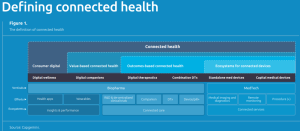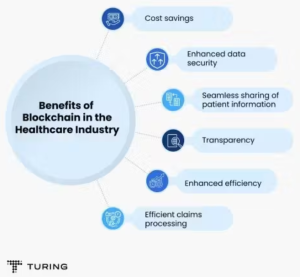AI & Blockchain Healthcare Revolution
The healthcare sector is undergoing a significant transformation with the adoption of advanced technologies. Blockchain and AI are at the forefront of this change, offering solutions that enhance data management, security, patient care, and operational efficiency. As healthcare becomes more digital, these technologies are crucial for improving interoperability, reducing fraud, and optimizing workflows across medical institutions, health insurers, pharmaceutical companies, and government agencies. According to Capgemini, the global connected health market is projected to grow at a compound annual growth rate (CAGR) of 25%, reaching around $520 billion by 2032, where blockchain, AI and IoT play a major role in cost savings and process improvements
Source: Capgemini
How Blockchain and AI are Shaping the Future of Healthcare
Blockchain Technology
Blockchain is a decentralized ledger technology that ensures secure, transparent, and immutable record-keeping. In healthcare, it facilitates secure data sharing among authorized providers, enhancing interoperability and trust, especially valuable for securing patient records, insurance claims, clinical trials, and drug traceability. Some of the most impactful blockchain applications in healthcare include:- Patient Data Management: Blockchain ensures medical records are securely stored and shared only with authorized providers. Patients own their data, they are self sovereigns.
- Fraud Prevention: In the U.S. alone, healthcare fraud costs over $300 billion annually, much of which could be reduced with blockchain’s immutable transaction logs [STL Partners and NHCAA].
- Interoperability: With blockchain, different healthcare organizations can securely exchange patient data without compatibility issues, keeping privacy or even anonymity of patient data if required or defined by the user.

Source: [Turing]
AI Technology
AI leverages machine learning and predictive analytics to improve healthcare efficiency and accuracy. It’s already reducing misdiagnoses, speeding up drug discovery, and automating administrative workflows. Key AI applications include:- AI-Powered Diagnostics: AI-driven solutions are revolutionizing healthcare diagnostics by enhancing accuracy, reducing errors, and accelerating the time required for clinical decision-making. Intelligent medical products and systems are enabling faster, more accurate diagnostics by integrating AI, IoT, and connected devices across healthcare systems.
- Predictive Analytics in Healthcare: AI-driven models can forecast disease progression and alert doctors about at-risk patients. AI-powered medical imaging is its ability to process multimodal data—combining radiology images, lab results, and clinical notes—to provide a comprehensive, AI-assisted diagnosis. This approach improves interpretation accuracy and early disease detection by synthesizing insights from multiple data sources, as well as providing personalized treatments.
- Automated Administrative Tasks: AI chatbots and virtual assistants are helping reduce hospital workload. AI is playing a crucial role in automating workflows for radiologists and pathologists, helping them prioritize high-risk cases, reduce administrative burdens, and enhance patient care efficiency.
The Future of EMRs: Integrating Blockchain for Data Interoperability and Enhanced Security
Traditional EMRs (Electronic Medical Records) often suffer from data silos and security vulnerabilities. Blockchain addresses these issues by providing a secure and interoperable framework for managing patient records. Patients can control access to their data, ensuring privacy and consent management. Healthcare providers can access accurate and up-to-date information, leading to improved patient outcomes.Electronic Medical Records (EMRs) are essential for managing patient data, healthcare executives report challenges with data interoperability between hospitals, insurers, and labs.How Blockchain Improves EMRs:- Interoperability: Blockchain creates a shared but secure system where all authorized parties can access patient records.
- Data Ownership: Patients own their health records and grant permission for access, rather than hospitals controlling the data. Patients may also opt for monetizing their records, offering anonymous data to research and being paid with no intermediaries. This contributes to faster and efficient research and development work at institutions, including patent management.
- Cybersecurity: Healthcare data breaches exposed more than 170 million patient records in 2023, with blockchain offering tamper-proof solutions [Protenus Breach Barometer].
Blockchain & AI: A Winning Combination in Healthcare
The convergence of blockchain and AI offers powerful solutions:- Data Security and Analysis: Blockchain ensures secure data storage, while AI analyzes this data to provide actionable insights.
- Clinical Trials: Blockchain maintains the integrity of trial data, and AI algorithms can process and analyze large datasets more efficiently than human researchers, identifying patterns and correlations that might be missed otherwise. This capability accelerates decision-making processes, potentially reducing the duration and costs of clinical trials. [Hashstudioz.com]
- Supply Chain Management: Combining blockchain's traceability with AI's predictive capabilities ensures the authenticity (counterfeit drugs reduction) and availability of medical supplies.
Overcoming Barriers to Blockchain and AI Adoption in Healthcare
Despite the benefits, AI and blockchain face regulatory, technical, and ethical hurdles:- Regulatory Compliance: Adopting blockchain for medical records requires HIPAA and GDPR compliance.
- Interoperability Issues: Blockchain solutions must integrate with legacy EMR systems.
- Trust & Ethical Concerns: AI-driven diagnostics must maintain transparency and accountability.
Conclusion
Blockchain and AI are revolutionizing healthcare, making data management, security, and patient care more efficient. These innovations will reduce costs, improve outcomes, and future-proof the healthcare industry.Now is the time for CEOs and healthcare executives to adopt AI and blockchain-driven solutions to stay ahead of regulatory and operational challenges.Note: This blog post is intended for informational purposes and should not be considered as professional medical advice.Schedule a Meeting: Future-Proof Your Healthcare Business
Interested in how AI & blockchain can transform your healthcare system?
Let’s discuss a customized strategy for your organization.
